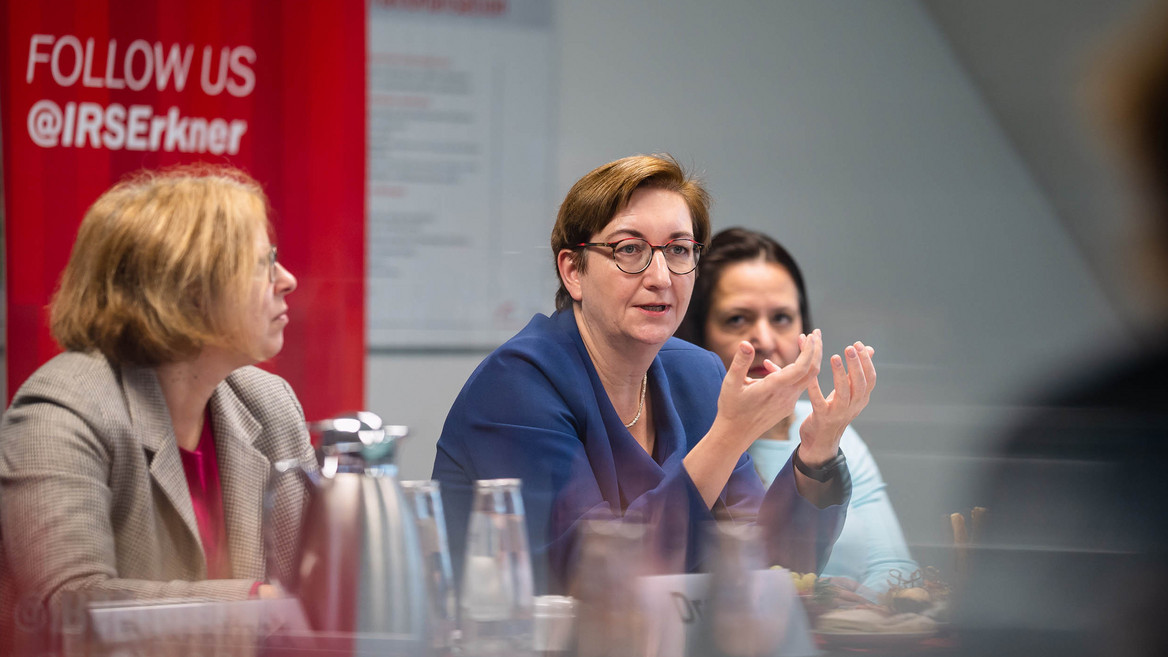Main Content
Federal and State Government Invest in Erkner

During their joint visit to the IRS on 14 February, Federal Construction Minister Klara Geywitz and Brandenburg's Science Minister Manja Schüle announced that both ministries would provide a total of 15 million euros for the renovation of the institute building.
The IRS is delighted to receive this major support from its two institutional funding bodies and sees this as recognition and an incentive for forward-looking research at the institute.
We are sharing the press release from the two ministries here:
"Federal and state governments invest in Erkner site
The Federal Ministry of Construction and the Brandenburg Ministry of Science are supporting the Leibniz Institute in Erkner with 15 million euros for the refurbishment of its building.
Cutting-edge research is carried out in Erkner that provides insights into how social spaces develop in Germany and in international comparison. What sounds abstract at first describes how people's surroundings are changing and with them their everyday lives.
Affordable living space is needed throughout Germany. Cities have to adapt to climate change, regions have to cope with structural change and villages have to become attractive again. How can the necessary changes be organised? Are our planning and participation instruments still fit for the future? How do they need to evolve in order to resolve conflicts democratically and drive forward the necessary construction projects?
Researchers at the Leibniz Institute for Research on Society and Space (IRS) have been providing answers to these questions from Erkner since 1995. They moved into the listed administrative building of the former Bakelite factory there. Almost thirty years later, it is high time to carry out repairs that can no longer be postponed. The roof is broken, for example, but work also needs to be done quickly on occupational safety, fire protection and accessibility.
The state of Brandenburg, through the Brandenburg Ministry of Science, Research and Culture, and the federal government, through the Federal Ministry of Housing, Urban Development and Construction (BMWSB), are providing half of the funds totalling 15 million euros. This will be used to rebuild the roof, renovate the drinking water and waste water pipes and update the heating supply. Barrier-free accessibility is also planned for the remodelling. The measures will be implemented between 2025 and 2027.
Manja Schüle, Minister of Science, Research and Culture of the State of Brandenburg, comments:
"Whether it's a turnaround or (structural) change: Brandenburg knows a thing or two about transformation! The Leibniz Institute for Research on Society and Space is always close to disruptive regional developments - an excellent point of contact for those involved in the transformation of space and society far beyond Brandenburg. I am delighted that we as a state are investing almost one million euros from the Brandenburg package in energy resilience and, together with the federal government, a total of 15 million euros in the renovation of the institute over the next few years. Because modern research approaches also need modern conditions!"
Klara Geywitz, Federal Minister for Housing, Urban Development and Construction, commented:
"Here at the IRS in Erkner, research is being conducted into how our country is developing. From Brandenburg, information is collected throughout Germany that makes it easier for villages, small towns and regions to plan good and equal living conditions for local people. This important and effective research needs a repaired roof over our heads, a modern CO2-saving heat supply and more accessibility through fewer barriers. Together with the state of Brandenburg, we are investing in the refurbishment of the building and thus in good research that has an impact beyond Brandenburg."
Oliver Ibert, IRS Director, comments:
"Society is facing more and more crises and disruptive events. With our research, we at the IRS want to contribute to finding sustainable solutions for urban and rural areas. At the Erkner site, we benefit from our proximity to the metropolis of Berlin and at the same time have our finger on the pulse of Brandenburg's dynamic development. Our historic institute building reminds us daily of the transformations of recent decades. The construction project gives us a perspective for the future: more than ever, the IRS will be a place for academic originality and dialogue with practice."

